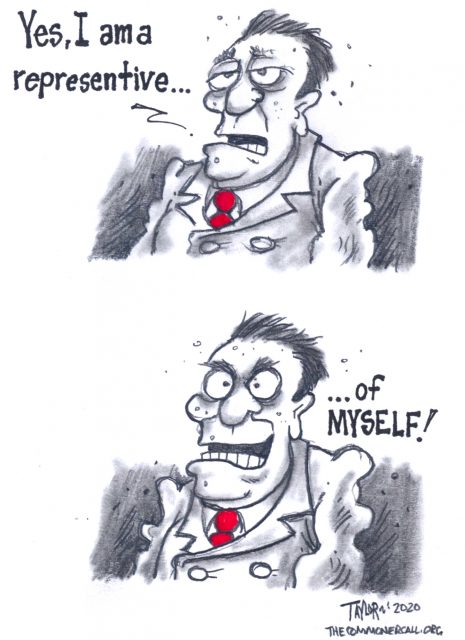
“The stock trading was bipartisan—27 Democrats, 21 Republicans, and 1 independent were making trades as the devastation that Covid-19 would exact on the U.S. crystallized.”
By Jake Johnson
Common Dreams (5/30/20)
A new analysis of financial disclosure documents found that Republican and Democratic members of Congress made nearly 1,500 stock transactions worth up to $158 million between February and April as the coronavirus spread across the U.S., heightening suspicions that elected officials in charge of the federal response to the pandemic have opportunistically cashed in on it.
The Campaign Legal Center (CLC), a non-partisan watchdog group, uncovered at least 127 purchases or sales in securities by senators and at least 1,358 transactions by members of the House between February 2 and April 8.
“Of those transactions, some members of Congress were strategically buying stocks in companies that might see a boost during the crisis, as well as selling stocks that seemed likely to tank,” CLC said. “Public servants made purchases in remote work technologies, telemedicine companies, and car manufacturers that were shifting their production to ventilators. Sales were made in companies in the restaurant and hospitality industries.”
Last month, as Common Dreams reported, Sens. Richard Burr (R-N.C.) and Kelly Loeffler (R-Ga.) faced calls to resign after it was revealed that they sold off stock in late January and early February just before the market tanked due to the Covid-19 crisis.
The CLC analysis (pdf) shows that Burr and Loeffler—both of whom remain in the Senate—are not alone.
Bipartisan corruption
“The stock trading was bipartisan—27 Democrats, 21 Republicans, and 1 independent were making trades as the devastation that Covid-19 would exact on the U.S. crystallized,” CLC said. “Most congressional members are millionaires and a number have investments in the tens of millions and far more likely to have investments in the markets.”
Rep. Phil Roe (R-Tenn.) had the most transactions of any member of Congress with 366 worth between $2.4 and $10.6 million. Rep. Gilbert Cisneros (D-Calif.) trailed Roe with 219 transactions worth between $1.9 and $6.7 million.
“It’s ridiculous that the public should even have to wonder if a member’s personal financial interests are playing a role in any public policy, let alone the response to a crisis like Covid-19,” tweeted Delaney Marsco, ethics counsel with CLC.
While it is not clear whether any of the transactions were illegal, CLC said “the volume of trading during this short time period highlights a serious problem.”
“The onslaught of public disclosure in the next few months coupled with the increased financial hardship of Americans creates an opportunity for constituents to unite and demand a change from their elected representatives,” CLC said. “Disclosure is the first step towards government accountability, but to rebuild public trust in government, Congress needs to go further and restrict trading of certain individual stocks.”
(Our work is licensed under a Creative Commons Attribution-Share Alike 3.0 License. Feel free to republish and share widely.)
(Commoner Call cartoon by Mark L. Taylor, 2020. Open source and free for non-derivative use with link to www.thecommonercall.org )
*****
Congressional Stock Trading During Pandemic Torches Public Trust
By Kedric Payne, Delaney Marso & Sophia Gonsalves-Brown
Advancing Democracy Through Law (4/28/20)
Campaign Legal Center (CLC) reviewed financial disclosure reports between Feb. 2, 2020 and April 8, 2020 of congressional stock transactions. We found that as COVID-19 cases began to increase throughout the country in the weeks before the first three rounds of legislative relief packages, Senators and Representatives from both sides of the aisle traded securities – many related to the pandemic itself.
Thanks to the 2012 STOCK Act amendments to the financial disclosure laws, this is the first economic downturn in history where federal officials are required to disclose their securities trades within weeks of such trades.
The onslaught of public disclosure in the next few months coupled with the increased financial hardship of Americans creates an opportunity for constituents to unite and demand a change from their elected representatives.
This unprecedented transparency begs the question: do Americans want their elected legislators to avoid potential conflicts of interest by divesting themselves of individual stocks, or place them in blind trusts where they are not allowed to communicate with the independent trustee?
Executive branch officials more commonly divest of their securities that present a conflict, but Congress has avoided this approach.
Lucrative stock trades
When it came to light that several senators made lucrative stock trades shortly before the recent market crash, and after some received classified intelligence briefings about the imminence of the pandemic, severe public backlash ensued. It turns out they may only be the tip of the iceberg.
In the Senate, there were at least 227 purchases or sales in securities, ranging up to a total of $98.3 million by 12 senators. In the House, there were at least 1,358 transactions, ranging up to a total of $60.5 million by 37 House representatives. Of those transactions, some members of Congress were strategically buying stocks in companies that might see a boost during the crisis, as well as selling stocks that seemed likely to tank.
Public servants made purchases in remote work technologies, telemedicine companies, and car manufacturers that were shifting their production to ventilators. Sales were made in companies in the restaurant and hospitality industries.
The stock trading was bipartisan—27 Democrats, 21 Republicans, and 1 Independent were making trades as the devastation that COVID-19 would exact on the U.S. crystalized. More transactions are reported daily. At one level, this is not surprising because members of Congress are on average far wealthier than average Americans.
Most congressional members are millionaires and a number have investments in the tens of millions and far more likely to have investments in the markets. To date, Congress has so far exempted itself from the ethics requirements for personal investments imposed on senior officials of the executive branch. …
- GOOD NEWS! Internal GOP Poll Shows Stock-Dumping Georgia Senator’s Campaign Is Swirling Down The Drain — Sen. Kelly Loeffler, who has come under fire for dumping stocks after receiving classified coronavirus briefings in late February, appears to be going down in flames. An internal Republican Party poll obtained by the Atlanta Journal Constitution shows that Loeffler is placing fourth among all candidates in the Georgia GOP Senate primary, a stunningly low position for an incumbent. … Read The Rest

